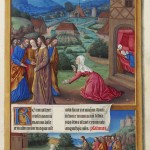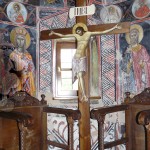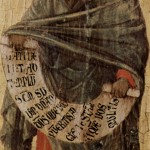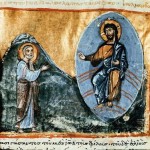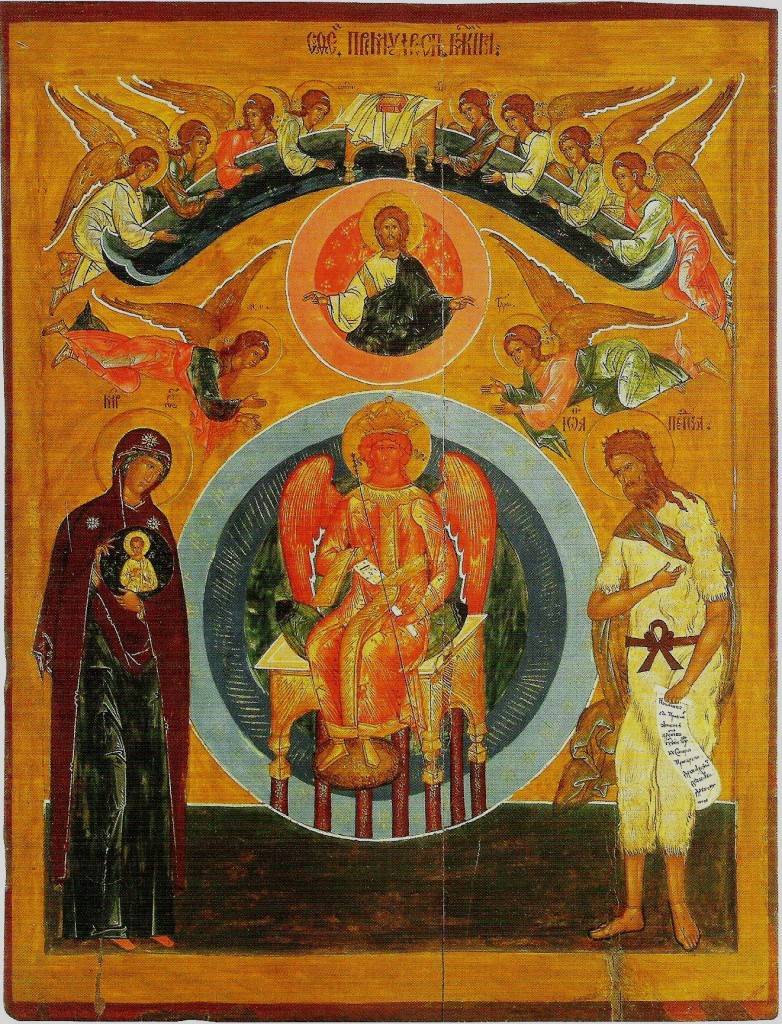
Proverbs 1:20-33 or Isaiah 50:4-9
What It’s About: These are two very different texts with a few common threads. The Proverbs text is an ode to Wisdom, who makes herself known to those who seek her. The Isaiah text is a defiant moment of self-identification by the prophet, putting either himself or his society (it’s not totally clear) in relationship to God. Both emphasize the role of teaching and knowledge, and the idea that God speaks to those who will listen. And both cast this knowledge in terms of opposition to enemies. In Isaiah the enemies are more explicit, but in Proverbs they are simply those who do not understand or respect Wisdom.
What It’s Really About: This section of Isaiah is one of the so-called “servant songs,” which usually get more attention around Advent and Christmas because Christians have interpreted them to foreshadow Jesus. This one describes a man who is being persecuted by enemies–his beard torn out and all sorts of abuse–and his steadfast resistance to them. This has earned comparisons to Jesus at the crucifixion, but of course Isaiah had something different in mind when he wrote it. Whether this refers to the prophet himself, and the way he was received in his own time, or whether it refers to Israel and the way it is treated amongst its neighbors, the upshot is clear at the end: verses 8 and 9 assert that God will help, and that the enemies cannot prevail.
What It’s Not About: Both of these passages have been part of the Christian effort to read Jesus into the Old Testament. The Isaiah passage has been read as a description of Jesus, as I noted above. But the Proverbs passage, along with lots of other Wisdom literature, was also an important way for Christians to understand the work of God in history. Wisdom (Sophia in Greek) was, along with the Logos, one of the ways that Christians understood the divinity that was in Jesus. Those divine aspects of Jesus had been around for a long time, Christians came to claim, and we can see them in texts like this one. Because of the first chapter of John, we associate the Logos with Jesus a lot more than Sophia, but Wisdom was one of the ways Christians thought about who Jesus was.
Maybe You Should Think About: It’s back-to-school season, so maybe there is space to think about the ways learning and knowledge fit in with Christian faith. What is the Christian responsibility to become educated? Is there one? I once heard a campus minister say to a crowd of college students, “being in college is your calling right now.” What does that calling to knowledge look like?
What It’s About: It’s another learning and knowledge text! This time, it’s all about the task of teaching–and how it shouldn’t be taken lightly. Teachers are like the rudder that steers the ship–do it wrong, and you’ve got big problems. For that reason, says this passage, you should think twice before attempting it. It’s a pretty big responsibility.
What It’s Really About: This is really about purity, when you get right down to it. The various examples that the author gives are all examples of little things influencing the larger whole. These examples would not have been out of place in some of Jesus’ parables, especially the ones about the kingdom, where things like yeast and seeds can really disrupt. The author is suggesting here that teaching is dangerous because it’s possible to introduce wrong ideas, even accidentally. For that reason, it should be left up to people who really know what they’re doing. This isn’t a very democratic sentiment, but it’s probably a pragmatic one if you’re trying to reign in teachings that don’t agree with you.
What It’s Not About: This is really not about teachers as we know them. Instead, the author of James is probably thinking more in terms of teaching within a religious community. He probably has in mind the problem of orthodoxy: how to have what is taught and learned within the community be true and right. False teachers are one of the things that the New Testament seems to be really worried about, and this passage is a good example. But we shouldn’t simply transpose “teachers” in this passage with the teachers we know well–those who teach 2nd grade or our shop classes or college composition. This is about a very specific kind of teaching–the kind that goes on in a religious community.
Maybe You Should Think About: Is this still a good model for teaching in congregations? Do we still limit who gets to have a voice of authority? Why or why not? And who gets to decide?
What It’s About: This is a really interesting story in the context of Mark, in which the disciples are almost always clueless and Jesus is often unsure of his own identity. This story has both, as the disciples get the wrong answer a few times, and then Jesus tells everybody to hush up about who he is (verse 30). The idiocy of the disciples and the “secrecy motif” are two of the defining features of Mark’s gospel, and they’re both on display here.
What It’s Really About: I’ve always wondered: was Jesus asking this question as a rhetorical question, or did he really want to know? Was this a pop quiz, asking the disciples for his identity to see if they got it right? Or was this Jesus fishing around for his own sake, trying to figure out who he was? That latter situation would be unthinkable for the other gospels, of course; Jesus tended to know exactly who he was. But for Mark, Jesus is never quite so certain. Did he really just want the disciples’ opinions?
And note that in the last section of this reading, after Peter says that Jesus is the messiah and Jesus tells him to shut up about it, Jesus goes back to referring to himself as the “son of man.” What’s going on there? Was this a repudiation, or was this Jesus asserting a different identity, or are we to understand that these titles should be interchangeable (they definitely weren’t in antiquity)? This whole story raises more questions than it answers–but then, that’s kind of Mark’s style.
What It’s Not About: This really isn’t about certainty. We have this tendency, as Christians, to think that the bible teaches certainty, or that Jesus experienced certainty. But stories like this one are almost tailor-made to wreck that idea. There is not much certainty to be found here. We aren’t meant to come out of this with a correct answer. We’re supposed to find ourselves troubled. Who do people say that I am? Good question. With lots of answers. Several of which will apparently get you rebuked by Jesus.
Maybe You Should Think About: This is one of those places where the existence of four gospels is really instructive. How different would our Jesus be if we only had this gospel? Or if we only had John? The early church preserved and passed on multiple gospels, in part because it valued multiple perspectives on Jesus. And the early church recognized, certainly, that they did not agree. But that was really part of the reason for having four gospels: the disagreement, as much as the agreement, was instructive. This passage on identity really contrasts with passages in other gospels where Jesus is much, much more confident. But I’m glad we have this one too.

